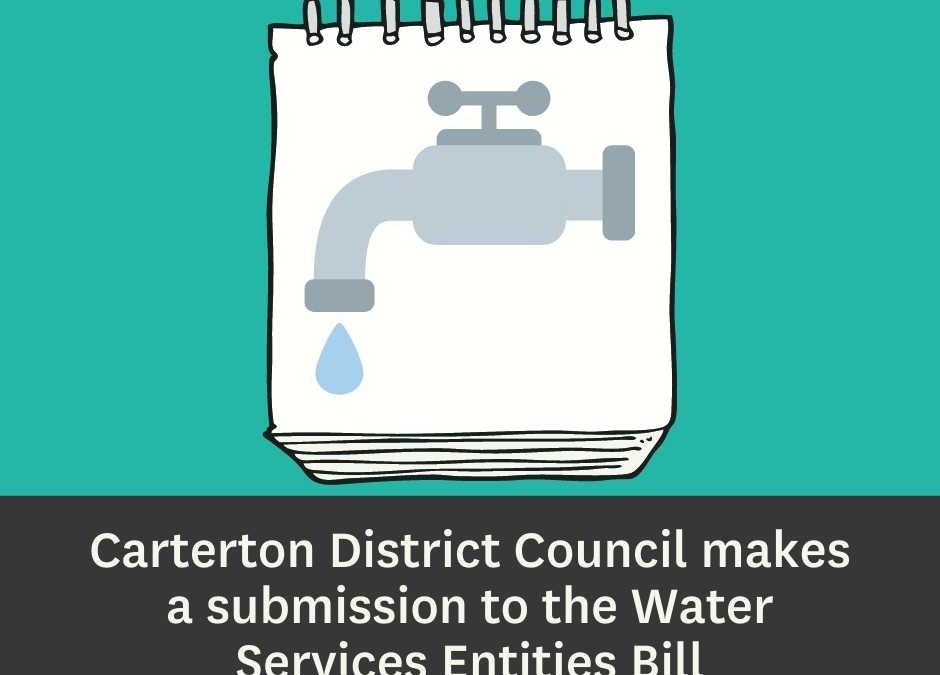22 July 2022
Carterton District Council has provided feedback on the ownership, accountability, and governance arrangements of the Water Services Entities Bill [WSE] via its Select Committee Submission.
The Government is changing the delivery of drinking water, wastewater and stormwater with its Three Waters Reforms. Under this plan, four new publicly-owned Water Services Entities will run New Zealand’s drinking water, wastewater and stormwater services – currently operated by Local Councils. The Government asked for submissions on WSE, which Carterton District Council has now completed.
The Council was grateful for the opportunity to make a submission on this bill, however, CDC expressed clear concerns on the following key areas as part of its submission:
- Employee Retention During the Establishment Period
The roles CDC’s water operations staff undertake form an essential part of the levels of service it delivers. The loss of just two or three key staff could result in CDC’s operational capacity collapsing. Council strongly encourages the Government to support Councils in retaining key staff during this transition period by instructing the National Transition Unit [NTU] to not actively recruit or second staff from Local Government Organisations [LGOs]. - Transition Engagement
The current NTU engagement model is not welcoming of feedback or questions, including at the CEO level. We believe this significantly increases the risk of a deficient transition and result in sub-standard outcomes for our staff and communities. - Governance and Local Representation
The current drafting of the Bill confirms small rural councils such as Carterton District Council will lose ability to influence the development of the District’s water services due to restricted numbers on the Regional Representation Groups [RRG]. The ability of our Iwi partners to engage, participate and voice issues will be similarly restricted. CDC recommends the Government ensure an all-inclusive representation, by not restricting numbers to an arbitrary number of 12 or 14 seats. - Planning integration
CDC is concerned about how WSEs integrate their planning with council planning processes that affect our communities’ wellbeing and placemaking (e.g., long-term plans, annual plans and the Wairarapa combined district plan, etc.). Council recommends Government ensure the upcoming WSE Planning Bill formally links LGO City and District Plans with WSE three waters planning and investment strategy and parallel timelines.
Council also made comments to specific clauses of the Bill which affect the following areas:
- Secondment of Council Staff to the NTU or WSE
Council staff’s role is to deliver water services to our communities and not to assist the NTU with transition activities for the next two years. In the event the clause is affected by the NTU or WSE, it places the burden on Council to backfill roles, which in a particularly tight labour market often results in long-term vacancies and significant additional workload pressure on remaining staff. Water service delivery to our communities must remain the highest priority for LGOs during the establishment period. - Employment of Senior Managers
The draft legislation is inconsistent with commitments made by the Minister for Local Government – that all staff except senior executives would be offered employment on terms and conditions substantially the same as what they have today. The broadening exclusion in the relevant clause creates wider exclusion and a great deal of uncertainty for our staff. - Employment Terms & Conditions
The phrase “general locality or a locality within reasonable commuting distance” is not defined in the Bill. This creates additional uncertainty regarding future employment security and the future work environment, individually, or collectively. - Representation of Small Communities and Iwi
The Eastern Central WSE has 21 LGO’s, 31 Iwi and over 200 Marae, which will be aggregated into the proposed RRG structure of no more than 14 representatives. At least 14 LGO’s and 24 Iwi will not be represented on the RRG.
The Council’s full submission can be found online here

